Interview: Joshua Oppenheimer and Adi on The Look of Silence
 Saturday, February 20, 2016 at 3:45PM
Saturday, February 20, 2016 at 3:45PM 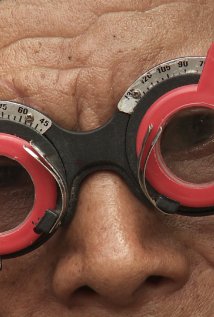 Amir here. I first fell in love with Joshua Oppenheimer’s The Look of Silence in September 2014, at TIFF. It was the last, and best, film I watched at that festival, and it left an emotional mark that I lived with for days. I caught up with the film again when it was released for the public and my conviction that this was one of the best documentary features of all time was reaffirmed – in my book, one of 2015’s holy trinity of films. So, you can understand my excitement when I finally had the chance to speak with director Joshua Oppenheimer, and Adi, the subject of his film.
Amir here. I first fell in love with Joshua Oppenheimer’s The Look of Silence in September 2014, at TIFF. It was the last, and best, film I watched at that festival, and it left an emotional mark that I lived with for days. I caught up with the film again when it was released for the public and my conviction that this was one of the best documentary features of all time was reaffirmed – in my book, one of 2015’s holy trinity of films. So, you can understand my excitement when I finally had the chance to speak with director Joshua Oppenheimer, and Adi, the subject of his film.
The Look of Silence, nominated for the Oscar for Best Documentary, a companion piece to the director’s earlier film The Act of Killing (also nominated in its year), is about the victims of the Indonesian genocide, who live side by side with the men who perpetrated those crimes against their loved ones. In his graceful and compassionate study of these people and their haunted spaces, Oppenheimer finds the language to bring invisible pains to the screen and push the limits of documentary form.
We talk about the relationship between his two films, his experiences in Indonesia, influences on his filmmaking, where documentary cinema stands today, and Adi’s life after the film’s release.
AMIR SOLTANI: I know you’re probably tired of comparisons between your two latest films, but I feel like there’s nowhere else to start but The Act of Killing. There’s a theatrical element to the first film that The Look of Silence, despite being polished, stylized and even often staged, doesn’t have. It’s more formally understated. What initiated your formal approach to the second film?
JOSHUA OPPENHEIMER: I think these two films are both rigorously about the present, or rather, the past’s role in the present. [More after the jump...]
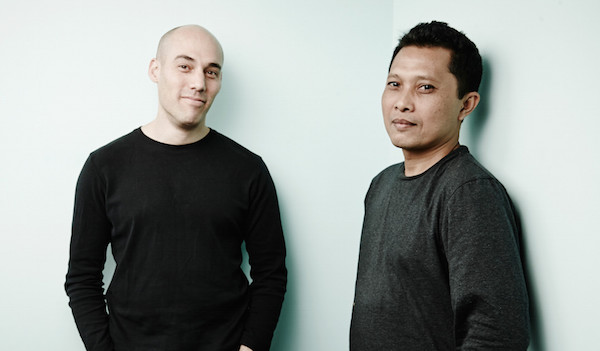 Director Joshua Oppenheimer & his subject Adi (The Look of Silence)
Director Joshua Oppenheimer & his subject Adi (The Look of Silence)
JOSHUA OPPENHEIMER: The Act of Killing is dealing with lies and stories that the perpetrators tell themselves to explain their actions and the terrible consequences of those lies for the society. In that sense, the film is about fantasy and escapism from guilt. I’d go so far as to say the director’s cut of the film [a 40-minute longer version now available on Netflix] is not a documentary but a fever dream about guilt and denial.
The Look of Silence is less flamboyant, but equally experimental. It’s quieter because it’s dealing with invisible fears and guilt. It’s asking the question of what it feels to live in a society that has been under the pressure of these presences for more than 50 years, what it’s like to live as a survivor and live among the people who committed those crimes against your loved ones. It’s about what decades of fear and silence do to a human being. The moments of absolute silence in the latter film are filled by the ghosts of the past, by the weight of history that needs to be respected. Any one of these quiet spaces carry a sense of claustrophobia and haunted-ness that I wanted to convey. In that sense, the longer cut of The Act of Killing and The Look of Silence are not really two films but two parts of the same piece, and even close together formally.
AMIR SOLTANI: You mention the moments of absolute silence and these are so powerful in the film. One in particular where you linger the camera on a body of water in the forest is haunting. Is this eeriness something that one feels to this extent in real life? What does it feel for someone who’s present there?
JOSHUA OPPENHEIMER: I visited the river where 500 people were killed about eight years earlier. It haunted me. I had a similar sense to visiting monuments of the holocaust. It’s a travesty that so much of the world looked away from, or even assisted like the US. I had so many emotions going there with Adi. You could feel the gravity of the un-mourned dead. Tens of thousands of families where never told that their loved ones where killed or where. They would say that their loved ones just hadn’t come back yet. When the survivors can’t even mourn the loss, the ghosts are there; they linger everywhere. They press in on us in the air. In that scene, the river running is left on the screen for about the amount of time it would take for a body to drift across that part of the river. It’s the closest I’ve ever come and I want to come to filming the dead. And from there we move to a village where we hear nostalgic music and the sounds of children talking very quietly, because the ghosts have moved from the river to the city, to the heart of the society. I don’t know if a casual visitor of the river would feel any of those things. The key was to create and render the space, so the poetic truth of it, this swarming and presence of ghosts becomes palpable.
Ideas and emotions that usually don’t come across on the screen in cinema are so palpable in your film. I want to ask about Adi’s relationship with the camera. The story is so painfully personal for you. How was it to share it with the camera?
ADI: This is a daily reality for me. I’m not very good at social formalities and niceties and I’m certainly not a performer. The experience for me was akin to living through the most important experience of my life.
The Look of Silence is more depoliticized and more personal and emotional compared to the earlier film. I often felt guilty being in the room with your subjects, where they’re confronting that much pent up emotion and history. Did you ever feel that yourself? That being there was wrong maybe? Or that it was uncomfortable?
JOSHUA OPPENHEIMER: I think my job as a filmmaker is to create a film, to make the invisible visible, to push everybody beyond their comfort zone, but within the safe space of making a film. Here, we’re retracing the steps of the most profound but invisible of human conditions: fear and silence. So we had to film with incredible precision. I rewatched as many films of Yasujiro Ozu’s films as I could get my hands on, as well as Diary of a Country Priest by Robert Bresson, to try and find a language to precisely focus on the invisible, to allow the audience to feel that. That’s why we don’t have any rough scenes of Adi just hanging around, or watching videos on my laptop. Had that been the situation, had Adi not been put in complete poise and calm, we wouldn’t perceive the pain, the weight, the ghosts. Adi’s calm demeanour makes possible this very difficult and precise formal language. But, even as one makes a non-fiction film, if you want it to be a great film, you have to try to push everyone beyond their comfort zones. Certainly, Adi’s last three confrontations in the film, pushed all of us. These are moments when I was continually questioning whether these moments were okay to film. Adi was my guide, and I respected him. It’s his family and his story and his community, and he thought this was an unlikely opportunity with my presence in this remote village, so he wanted to use the opportunity to open as much as possible. He wanted to expose and make visible as much as possible about this tragedy, and to gain as much support for the cause of reconciliation as possible.
I want to ask you about Islam in Indonesia, because even though the country has the biggest population of Muslims, it doesn’t really feature into the global conversation about the religion so much as the Middle East. And the focus of your film is more on “anti-communism” as opposed to Islamism. How much is the religion a factor today in Indonesia in the day-to-day life?
JOSHUA OPPENHEIMER: US’s support for the genocide and its silence about it has given the country a lot of impunity, and in return, US has gained an ally in the so-called war on terror. We can no longer really call it that, of course, but half of political body – the Republicans – still calls it ‘war on terror’. And of course, Indonesia is a strategic ally against the influence of China in the region. My experience was that at the time of the killings, and today in the region, none of the perpetrators were religious, whereas Adi’s family are deeply religious. They pray five times a day, and actually Adi recites the Azan prayer at the local mosque; he has an incredible voice. Maybe I should have showed more of his family’s religion to help dispel the myth that the victims were atheists. Certianly, in The Act of Killing you see the absence of any sense of piety among the perpetrators. I think the influence of domestic and global politics were much larger, and I think the film is structured to convey that it’s a complete lie that the genocide was an act of holy war by men of God against unbelievers. If anything, the reverse was true, the perpetrators were gangsters and thugs and drug dealers and leaders of prostitution rings, and the victims were ordinary people for whom religion offered a vision of a more just future.
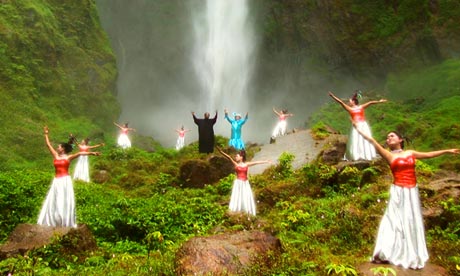 The Act of Killing
The Act of Killing
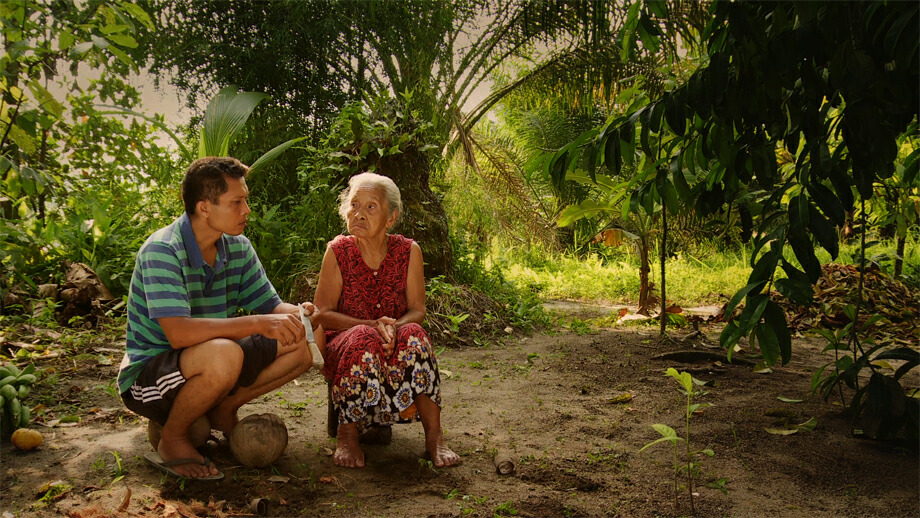 The Look of Silence
The Look of Silence
It seems like for the past half decade or so, with the films of filmmakers like yourself, or the Harvard Sensory Ethnography Lab, Robert Greene, Sarah Polley, Asif Kapadia and others, there’s been this explosion of creativity in the documentary field that mainstream audiences have had access to. As someone who’s at the centre of this phenomenon, what do you think is the impetus behind this? Is it because the rise of digital filmmaking has made it easier for talented people to get their voices heard?
JOSHUA OPPENHEIMER: I don’t see myself to be at the centre of anything. If I was, that would put me in a blind spot. It’s hard for me to make judgments about the field as a whole, but what I can say is that methodologically, non-fiction filmmaking is wide open, much more so than fiction filmmaking. The economics and the basic structure of a script, casting, staging, pre-production and editing is much harder to get away from and revolutionize, because of the very nature of the beast. I’m not saying there aren’t filmmakers who are making radical fiction films that have the potential to change the field, like one of my favourite filmmakers, Tsai Ming Liang. But non-fiction has no methodological rules at all. Certainly, the proliferation of digital filmmaking is part of it. Experimenting is much easier. And we’re in an age now that the participants that you approach are aware that a film that you make can completely transform their lives, because anyone will be able to see it online or in some form. If you were the subject of a Maysles or Wiseman film in past decades, you’d think that a small number of people would see the film, but not a large audience, or you wouldn’t be aware of it while participating. Digital has totally changed that. People are now always filming themselves through social media, for an imaginary or real audience. People are always already performing when they approach the camera now, they’re acting out idealized versions of themselves, acting out scripts drawn from television and advertising and fiction and second-hand stories. They’ve found idealized versions of themselves that they wish to fulfill. This is a real opportunity for the non-fiction filmmaker, to capture this self-styled performance. They’re making visible how the wants to be seen and compensating for the insecurities about who they feel they are. You can infer from these performances how they really see themselves. This has finally made the soil fertile for what Jean Rouche was trying to do with what he eventually dubbed cinéma vérité, a term that has been misused and abused in the US. He was giving people so many opportunities to make up fiction, act out fantasies in rudimentary ways; he’d screen the footage back to them and narrate that footage, and dub the footage, and the people would mirror back on to this picture their fantasies of who they were. In a sense, that description of cinéma vérité sounds an awful lot like what I’ve done in The Act of Killing. We’ve come full circle because of this moment of permanent self-reflexivity in which we’re all living all the time. It’s both a peril and an opportunity for the non-fiction filmmaker.
Adi, if you agree with Joshua that lives of the subjects can now be affected in a more immediate way, how would you say yours has changed?
ADI: At the moment, I can only answer that in a really physical sense. Before the launch of the film, we all met in Thailand to see if the film could be made and screened safely. We knew the film had to come out soon to capitalize on the momentum of the first one, if there was going to be any hope that it could begin some form of social change. We decided that we would be prepared to move from our city, to at least another region of Indonesia or even abroad, to ensure my family’s safety. Alongside the film crew, we had a full time crew of five people to ensure our safety at the time of filming. We moved to another part of the country, and thankfully our children have found much better schools and find it easier to live away from the shadow of the past and the presence of the perpetrators of the genocide amongst us. We feel more optimistic about our future.
JOSHUA OPPENHEIMER: I should add that, thankfully, Adi and his family have not been threatened by any harm, but were they to be put in that position, everything is ready for them to move to Denmark where I’m based. But we’re all hoping that doesn’t become necessary.
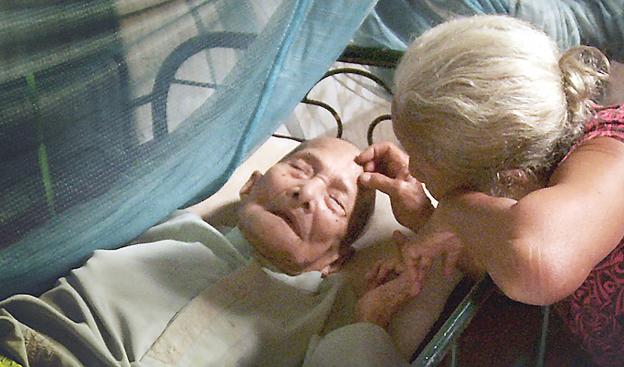
more interviews | more on documentary film | current Oscar race



Reader Comments (3)
Thank you for this.
I'm an Indonesian where G-30S-PKI has left an indelible mark on our life.
Thank god for Joshua who has bravely filmed it whereas Indonesian themselves hasn't even bothered to remember it at all.
The Look of Silence deserves the Oscar!
Fadhil -- it's so strange that AMY has been sweeping since it doesn't actually seem like its competition is weak.
This is one of the most devastating films I've ever seen. And so hauntingly shot. The confrontation with one of the perpetrator's daughter present is shattering.